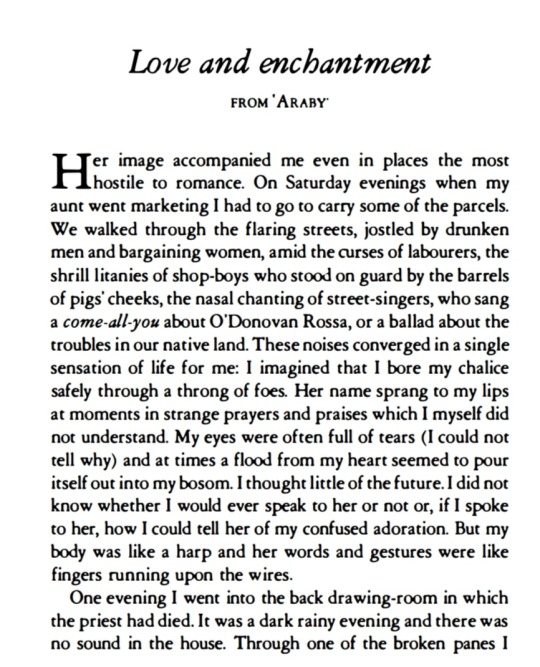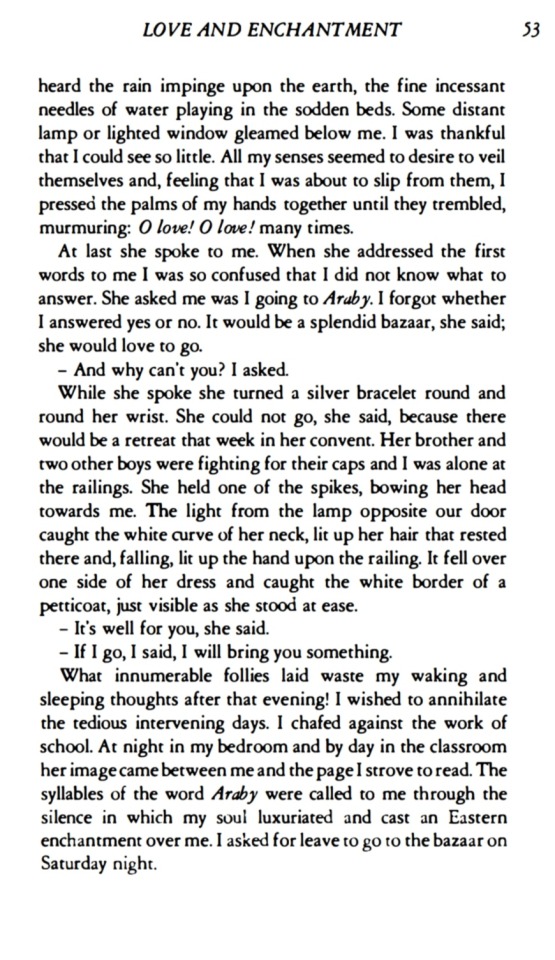#joycean
Photo
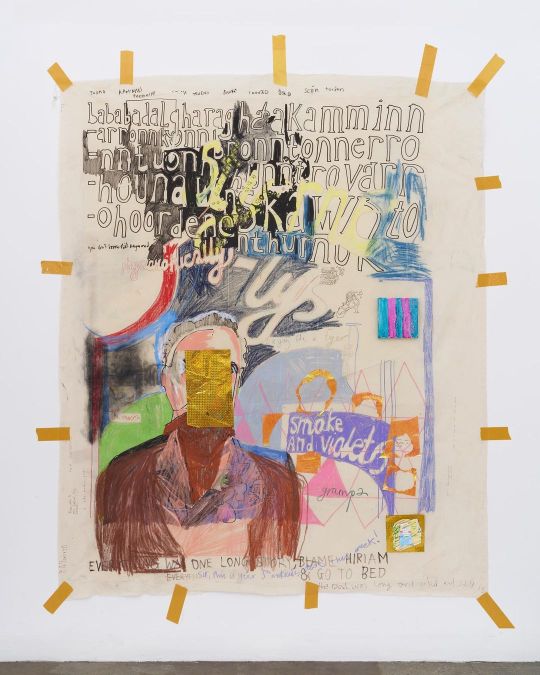
“The disruption of the skies above unwound parts inside of my infant self, which Nan couldn’t possibly have been aware of.” 👁️🗨️👁️🗨️👁️🗨️ Coal, pastel, acrylic ‘n’ collage shards on primed linen 110cm x 150cm #thunderwords #lowqualityimage #multimedia #portrait #words #imagism #realityeffect #joycean #painting https://www.instagram.com/p/Crk6dqAsdJY/?igshid=NGJjMDIxMWI=
2 notes
·
View notes
Text
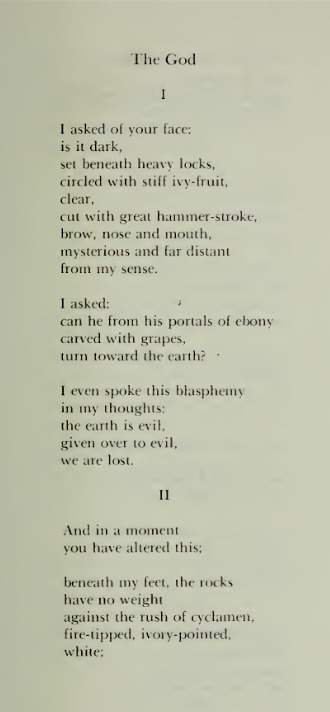
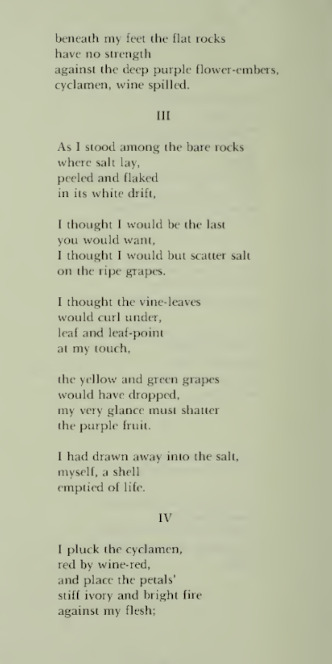
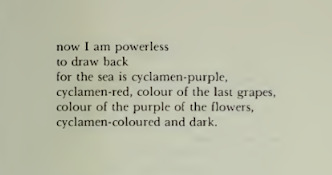
H. D. (hilda doolittle), from collected poems: 1912-1944, edited by louis martz, new directions, 1983.
#hilda doolittle#trova una pasturella di porfido#almost joycean in contiguous delineation; bronze by gold succumbs to red by winedark red
48 notes
·
View notes
Text
genuinely truly with my whole chest believe 212 by Azealia Banks (as dictated, as enunciated, as performed) is the finest expression of the modernist linguistic tradition in English in the 21st century
#the way she UTILIZES register and accent and dialect and code-switching#Literally Joycean and I am dead serious
24 notes
·
View notes
Text
You must understand, my humor does work on a higher level. What may seem to you like nonsense is actually joycean wordplay. There is a distinct train of logic underlying my jokes; I am simply not funny.
734 notes
·
View notes
Text
someone explain to me how and why hozier is so completely Gender ???
like... okay, i'm not talking about his voice. i'm setting his voice aside right now
my guy hozier literally wears Generic Dude Clothes. denim jacket? black jeans? plain white t-shirt? converse??? ray-bans? pretty sure every single thing he wears you could buy at like... gap??? even if he probably buys them at like allsaints and rag & bone and whatever. but i'm pretty sure dudes walk around on the street wearing his same exact look and don't look a quarter as Gender as he does?
ok, so then. voice aside. clothes aside. it has to be in part that he absolutely looks like he Smells Good? he looks like he smells like spicy cologne. and good fresh-scented soap. things that are normal to own and possible to purchase. but it can't be just that?
so also it has to be that he's like seventeen feet tall. he's so tall he doesn't fit in people's frames when they film him on their phone camera. dude is fucking six foot six. honestly no matter how many times people call me a short king my tiny 4'9-4'10 transmasc heart takes one look at the actual human tower that is hozier and sees Gender. and like. okay? i'm never going to be 6'6. i understand this
but then there's the part where despite his joycean lyrical talent and massive intellect he's soft-spoken and humble and not toxically masculine? and that's pretty Gender too but like, okay, i can achieve that
but there's like, a Thing about him? he's so Just Some Guy and yet so irrevocably Gender? i'm not even talking about the "bog king energy" everyone superimposes onto him, it's a very effortless thing on his part. is it his hands. is it his facial hair. is it actually his voice??? is it everything??? what is he doing?
#perhaps it is his accent#the way he sings 'the unemployment of the mouth'#idk i haven't figured it out#hozier#i'm having a Regular evening
94 notes
·
View notes
Note
Any thoughts on Byatt, on the occasion of her passing?
I read Possession one summer when I was in college and thought it was extraordinary. (Intimidatingly so, which may be why I never read another of her novels, though Possession is generally said to be her best.) I need to read it again. I can't believe it never came back into fashion with the dark academia trend. Maybe it's too brainy, or maybe it's that the (mostly) heterosexual romance lacks yaoi potential à la Dorian Gray, Maurice, and Brideshead Revisited. For anyone unfamiliar, Possession is about two late-20th-century British academics investigating the lives of two fictional Victorian poets (one loosely based on Robert Browning, the other on Christina Rossetti), and both pairs' possible love affairs with one another. Byatt narrates in a sprightly comic style with no little lyric potential, derived, I now see, from her great models George Eliot and Iris Murdoch, but she also parodies every other kind of relevant style with Joycean or Nabokovian aplomb, giving us jargony feminist essays, image-jeweled Victorian fairy tales, fulsome 19th-century correspondence, jagged Browningesque dramatic monologues, dreamy Pre-Raphaelite ballads, and more. The climatic vindication of writing and reading as almost prophetic activities, this against the reductively ideological approach of the Theory era Byatt was writing within and against, should be carved above the lintel of whatever English departments remain:
There are readings—of the same text—that are dutiful, readings that map and dissect, readings that hear a rustling of unheard sounds, that count grey little pronouns for pleasure or instruction and for a time do not hear golden or apples. There are personal readings, which snatch for personal meanings, I am full of love, or disgust, or fear, I scan for love, or disgust, or fear. There are—believe it—impersonal readings—where the mind's eye sees the lines move onwards and the mind's ear hears them sing and sing.
Now and then there are readings that make the hairs on the neck, the non-existent pelt, stand on end and tremble, when every word burns and shines hard and clear and infinite and exact, like stones of fire, like points of stars in the dark—readings when the knowledge that we shall know the writing differently or better or satisfactorily, runs ahead of any capacity to say what we know, or how. In these readings, a sense that the text has appeared to be wholly new, never before seen, is followed, almost immediately, by the sense that it was always there, that we the readers, knew it was always there, and have always known it was as it was, though we have now for the first time recognised, become fully cognisant of, our knowledge.
I was pleased to see a long story by Byatt, "The Thing in the Forest," in the Norton Introduction to Literature, which I used the one time I taught the class of that name, in the ill-fated spring semester of 2020. If you've never read Byatt, this story or novelette is a good place to start. It does a lot of what Possession does in miniature, synthesizing witty metafiction, aestheticized fantasy, and moving historical reality into a work of the latter-day Romantic imagination.
I also want to recommend Imagining Characters, an under-discussed book of conversations between Byatt and the Brazilian psychoanalyst Ignês Sodré about six novels: Mansfield Park, Villette, Daniel Deronda, The Professor's House, An Unofficial Rose, and Beloved. (I've still never read that Murdoch, I confess.) This book is probably why I think of Mansfield Park, Villette, and Daniel Deronda as forming a loose trilogy of 19th-century "problem novels" (like Shakespeare's "problem plays") that challenge any cheap 20th-century talk about the complacency, sentimentalism, meliorism, or all-around naiveté of "bourgeois realism." Plus Sodré and Byatt are superb readers, and it's a pleasure to "listen" to them in conversation.
The Paris Review unpaywalled their interview with Byatt today. I'd never read it before. She says much of interest; she even criticizes Kazuo Ishiguro in the same terms as I have, for writing international literature by subtracting specificity, though she later praises The Unconsoled for its insight into the psychology of the artist. She seems ambivalent about realism, constantly invoking fairy tales, even saying this about Murdoch—
I think Iris learned a great deal from the French surrealists, and then somehow went and sat in Oxford and became a slightly less interesting novelist than she would have been if she had stayed in contact with the world of Beckett and Queneau—she would never have gone into Sarraute-like writings. I think she developed a theory about the virtues of Jane Austen that wasn’t all that good for her.
—and this about herself:
If you asked me what I wish I’d written, I would say Borges’s “Pierre Menard, Author of the Quixote.” That is a completely pointless postmodernist structure of total beauty that nevertheless has a profound point.
The interviewer notes her nonconformist heritage, what links her to George Eliot as well as to Lawrence and to Leavis. She acknowledges it, but notes as well another way, even within the deep English Protestant imagination:
There’s a Spenserian aspect of Milton that I love. It’s the exotic. It’s the extraordinary metaphors. It’s the luscious sensuousness of him. It isn’t the stern puritan. I think I made something of Spenser that was the presence of stories about unreal things in a serious, real world.
"The Last Spenserian." There are worse epitaphs. Now I just need to read more of her novels.
20 notes
·
View notes
Note
So I have a question that I only trust you to answer: I aspire to be a guy who's read Ulysses but google searches are giving me conflicting information on which edition is best. Gabler? Bodley Head? Random House? Which would you recommend?
I unequivocally recommend the Gabler edition for two reasons:
It's been the gold standard in Joyce studies for over three decades, which makes a lot of the scholarship more accessible to people outside of academia who are curious about critical perspectives on the text.
The line numbers and pagination are synced with Gifford's annotations, which are an invaluable resource for both first time readers and seasoned Joyceans, as they provide explanations and context for the references Joyce makes in the text. I think a lot of people (and ogres) are so intimidated by how dense Ulysses can get that it impacts their ability to become properly engrossed in the actual book, and the joy of discovery turns into another bowl of Kellogg's Cornflakes to resentfully shovel down in a bid for self-improvement.
That being said, the 1922 and 1961 editions both have their proponents—here is an article about how heated the discussion got at a James Joyce conference ("Miami J'yce") that took place about five years after the Gabler edition was released.
#ironically one of the most important messages in the book is that cleverness will not serve us as it served odysseus—it can't bring us home#ulysses#anonymous#assbox#i read much of the night and go south in the winter#james joyce
46 notes
·
View notes
Text
I suddenly feel the obnoxious urge to give a piece of advice/recommendation no one has asked for because I’m passionate about it…there are many read along guides to Ulysses, but the best one for a first time reader is not the classic New Bloomsday Book or Stuart Gilbert’s classic study: it is Julian Rios’ novel The House of Ulysses. It’s weird to recommend a novel to read a novel, but the Rios deliberately doubles as a chapter by chapter guide to the novel, listing off all the famous correspondences and plot summaries etc…it’s also a novel about a group of relatively diverse Joyceans on a Bloomsday tour who, throughout their short chapters, debate and bring up different points and observations from a variety of perspectives on each chapter as they go through it, bristling with enthusiasm. Rios is a great writer but he clearly wrote it more to be a unique and fun guide than his own masterpieces (like Larva, which is often called—-of course—-the “Latin American Finnegans Wake”). I lend that one out to friends who try Ulysses for the first time and they have all loved it: fandom in your pocket, next best thing to a reading group
25 notes
·
View notes
Text
youtube
The Pogues, "Bottle of Smoke"
One of those public personages who, when they die, the common comment concerns surprise at how long they managed to live.
Shane MacGowan has died, age 65.
A classic three-album run with The Pogues his enduring legacy. This number a good example of his songcraft and the band's way with a tune.
"Twenty-fucking-five to one,
Me gambling days are done.
I bet on a horse called the Bottle of Smoke,
And my horse won."
aav.
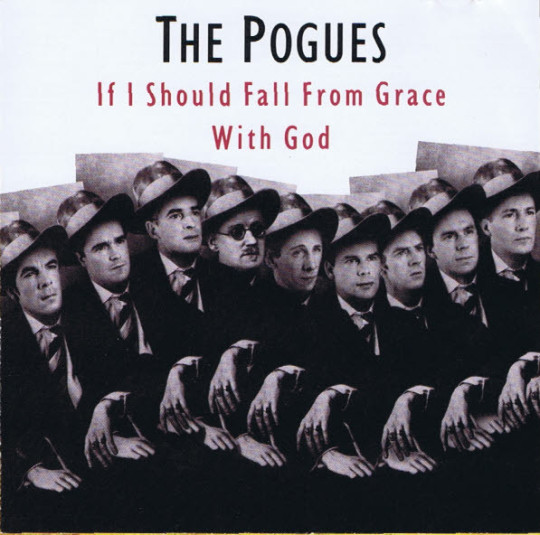
I rather prefer the alternate cover, with its multiplicity of Joycean figures.
4 notes
·
View notes
Text
i truly believe roberto aguirre-sacasa wouldve thrived as either like a 20s joycean intertextual modernist. or a 70s politico magical realist. an artist for all eras. as long as its one of these three
10 notes
·
View notes
Text
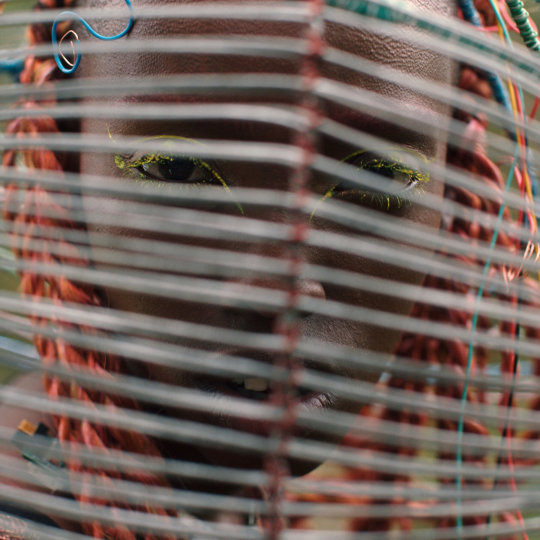
Neptune Frost (Anisia Uzeyman, Saul Williams, 2021)
Cast: Cheryl Isheija, Elvis Ngabo, Bertrand Ninteretse, Elane Umuhire, Dorcy Rugamba, Rebecca Uwamahoro, Trésor Niyongabo, Eric Ngangare, Natacha Muziramakenga, Cécile Kayirebwa, Diogène Ntarindwa. Screenplay: Saul Williams. Cinematography: Anisia Uzeyman. Production design: Cedric Mizero, Antoine Nshimiyimana. Film editing: Anisha Achyara. Music: Saul Williams. Costume design: Cedric Mizero.
Neptune Frost is ... well, what is it? An American-Rwandan anti-colonialist, anti-capitalist queer sci-fi musical about the confluence of the autochthonic and technology? If you go looking for more descriptives, you'll encounter concepts like "cyberpunk" and "Afrofuturist" that seem appropriate but also insufficient to characterize the film. And don't expect any spoilers here; I couldn't go into particulars on the plot if you forced me to. It starts in a coltan mine: That's the ore from which the stuff that helps run our computers and cell phones and whatnot is refined. It's a "conflict mineral": Wars, trade and otherwise, are fought over it. And then the story moves, through the peregrinations of our protagonists, Neptune, played by both Cheryl Isheija and Elvis Ngabo (the character is intersex), and Matalusa (Bertrand Ninteretse, aka Kaya Free), to an e-waste dump that becomes a hacker community that takes over the world's computers. Confused? Just go with it: This is an extraordinary movie, both in the watching and in the backstory of how it was made. There is poetry and wit here that needs more than one viewing to assimilate. For example, the name Matalusa is a Joycean pun: "martyr and loser," and by the end of the film it becomes Matalusa King -- Martin Luther King. There is music and color here -- a special nod to Cedric Mizero's costume design. So maybe it's not a film for everyone, but I am dazzled and baffled by it.
5 notes
·
View notes
Text
honestly disco elysium is so joycean to me...
5 notes
·
View notes
Text
Travelling without me makes him feel separation anxiety: not good at all.
But anytime he's away he writes me the bawdiest, most delightful Joycean love letters: extremely good.
9 notes
·
View notes
Text
“People will cheerfully admit that the internet has destroyed their attention spans, but what it’s really done away with is your ability to think. Usually, when I’m doing something boring but necessary—the washing up, or walking to the post office—I’ll constantly interrupt myself; there’s a little Joycean warbling from the back of my brain. ‘Boredom is the dream bird that broods the egg of experience.’ But when I’m listlessly killing time on the internet, there is nothing. The mind does not wander. I am not there. That rectangular hole spews out war crimes and cutesy comedies and affirmations and porn, all of it mixed together into one general-purpose informational goo, and I remain in its trance, the lifeless scroll, twitching against the screen until the sky goes dark and I’m one day closer to the end. You lose hours to—what? An endless slideshow of barely interesting images and actively unpleasant text. Oh, cool—more memes! You know it’s all very boring, brooding nothing, but the internet addicts you to your own boredom. I’ve tried heroin: this is worse. More numb, more blank, more nowhere. A portable suicide booth; a device for turning off your entire existence. Death is no longer waiting for you at the far end of life. It eats away at your short span from the inside out.”
— Sam Kriss, “The Internet Is Already Dead”
3 notes
·
View notes
Photo
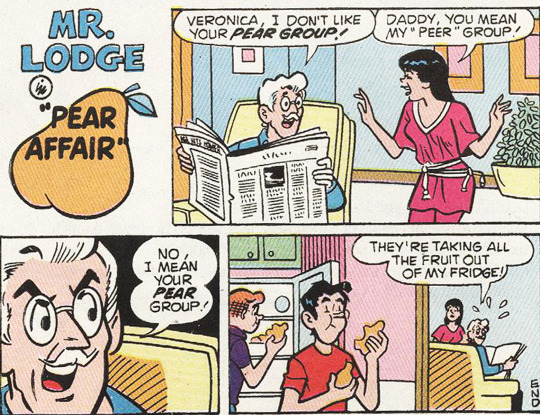
joycean wordplay
cézanne pears
it’s all archie
2 notes
·
View notes
